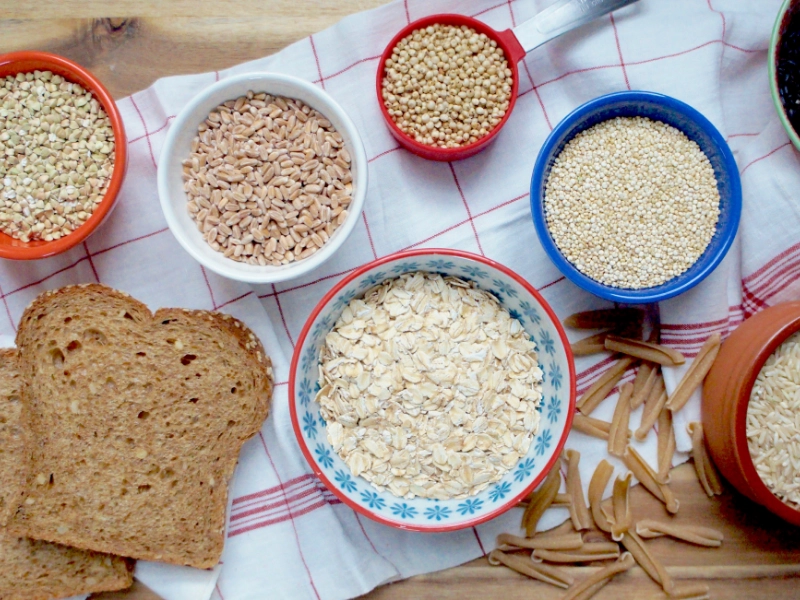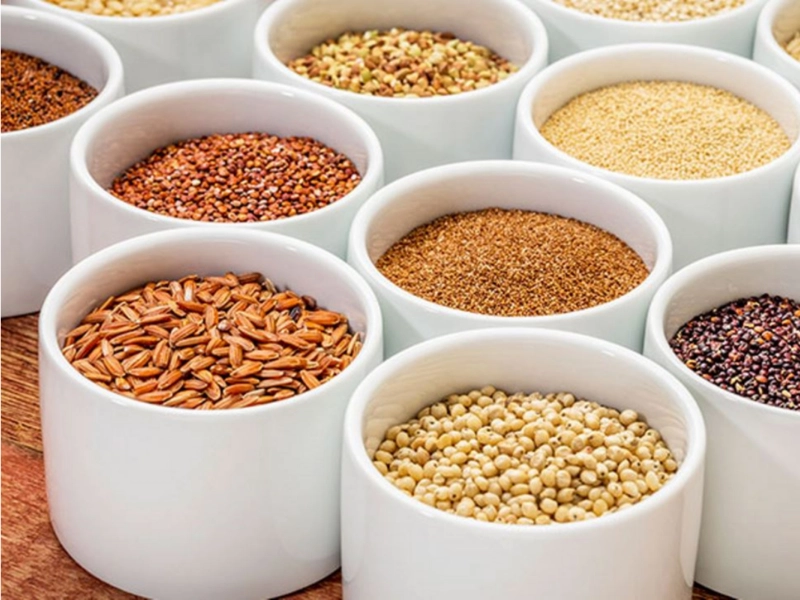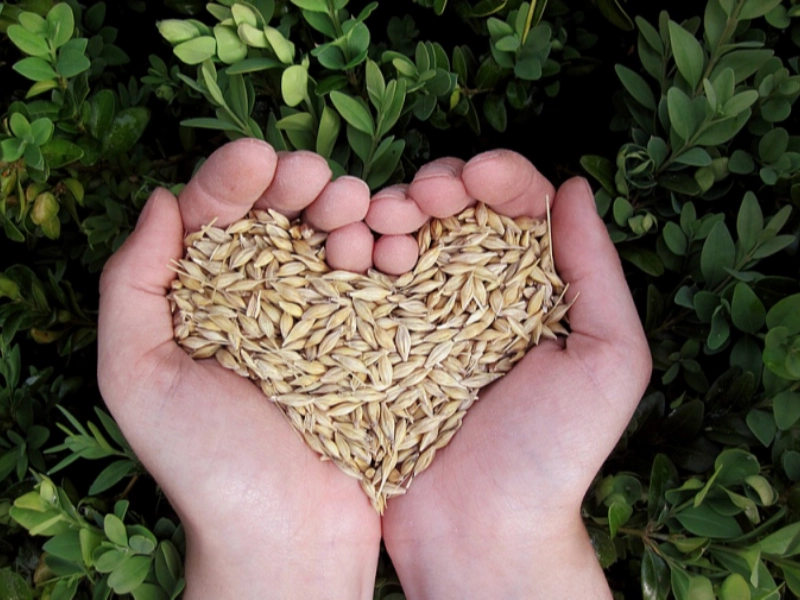Longevity and Grains: How They Support Good Ageing
Promoting longevity and good ageing depends much on grains. Packed with antioxidants, fibre, and other nutrients, whole grains have many health advantages that can improve general well-being as we become older. This page investigates how including different grains in our diets could help longevity, heart health, digestion, and even cognitive ability. Knowing the important part grains play can help us choose foods that support a longer, better life.
1. Whole Grains' Nutritional Values

2. Whole grains and heart health
 As we become older, heart health becomes a big issue; whole grains can help greatly lower our risk of cardiovascular problems. Whole grains have been linked in studies to decreased blood pressure, lowered cholesterol, and better general heart health. This is mostly related to the great fibre content, which keeps blood pressure levels normal and helps reduce LDL (bad cholesterol).
Phytochemicals and antioxidants, among other helpful substances found in whole grains, help maintain heart health. Both oxidative stress and inflammation—two factors connected to heart disease—are reduced by these molecules. For instance, oats provide beta-glucans, a kind of soluble fibre found to significantly lower cholesterol levels.
Furthermore, whilst magnesium supports good blood vessel function, potassium present in whole grains helps control blood pressure. Whole grains should be a mainstay of your diet if you want to greatly improve your heart health and lower your risk of heart-related problems as you become older.
As we become older, heart health becomes a big issue; whole grains can help greatly lower our risk of cardiovascular problems. Whole grains have been linked in studies to decreased blood pressure, lowered cholesterol, and better general heart health. This is mostly related to the great fibre content, which keeps blood pressure levels normal and helps reduce LDL (bad cholesterol).
Phytochemicals and antioxidants, among other helpful substances found in whole grains, help maintain heart health. Both oxidative stress and inflammation—two factors connected to heart disease—are reduced by these molecules. For instance, oats provide beta-glucans, a kind of soluble fibre found to significantly lower cholesterol levels.
Furthermore, whilst magnesium supports good blood vessel function, potassium present in whole grains helps control blood pressure. Whole grains should be a mainstay of your diet if you want to greatly improve your heart health and lower your risk of heart-related problems as you become older.
3. Longevity and Dietary Health
 Particularly as we become older, general well-being depends on maintaining excellent gut health. Dietary fibre abundant in whole grains helps to maintain regular bowel motions and good digestion. Enough fibre maintains good gut flora and helps avoid constipation, a common problem among elderly people.
Whole grains' fibre functions as a prebiotic, giving helpful intestinal flora food. Improved digestion, a strengthened immune system, and even greater mental health are connected to a healthy gut flora. Studies have indicated that a varied and healthy gut microbiota can lower the incidence of age-related disorders and help to explain lifespan.
Furthermore, by encouraging a sensation of fullness and lowering total calorie consumption, whole grains can help control weight. Older persons especially should pay close attention to this since keeping a good weight helps avoid several health problems like heart disease and diabetes. Whole grains can maintain digestive health and extend lifespan by being included in your diet.
Particularly as we become older, general well-being depends on maintaining excellent gut health. Dietary fibre abundant in whole grains helps to maintain regular bowel motions and good digestion. Enough fibre maintains good gut flora and helps avoid constipation, a common problem among elderly people.
Whole grains' fibre functions as a prebiotic, giving helpful intestinal flora food. Improved digestion, a strengthened immune system, and even greater mental health are connected to a healthy gut flora. Studies have indicated that a varied and healthy gut microbiota can lower the incidence of age-related disorders and help to explain lifespan.
Furthermore, by encouraging a sensation of fullness and lowering total calorie consumption, whole grains can help control weight. Older persons especially should pay close attention to this since keeping a good weight helps avoid several health problems like heart disease and diabetes. Whole grains can maintain digestive health and extend lifespan by being included in your diet.
4. Grains and Obesity Control
 A major component of good ageing is weight control; hence, whole grains can be a great friend in this respect. Unlike refined grains, which can cause spikes in blood sugar and more hunger, whole grains give a consistent release of energy, therefore preserving stable blood sugar levels. This can stop overindulgence and help to lower cravings.
Whole grains' great fibre count helps you feel full for longer stretches of time and adds to satiety. This can assist in weight loss or maintenance initiatives and help regulate portion sizes. Moreover, whole grains are nutrient-dense—that is, they offer necessary elements without too many calories—which makes them a perfect food for anyone trying to control their weight.
Including a range of complete grains—quinoa, brown rice, barley, and whole wheat—into your meals will help to diversify your diet and keep you full. Stressing whole grains will help you support your weight control objectives and encourage a better ageing lifestyle.
A major component of good ageing is weight control; hence, whole grains can be a great friend in this respect. Unlike refined grains, which can cause spikes in blood sugar and more hunger, whole grains give a consistent release of energy, therefore preserving stable blood sugar levels. This can stop overindulgence and help to lower cravings.
Whole grains' great fibre count helps you feel full for longer stretches of time and adds to satiety. This can assist in weight loss or maintenance initiatives and help regulate portion sizes. Moreover, whole grains are nutrient-dense—that is, they offer necessary elements without too many calories—which makes them a perfect food for anyone trying to control their weight.
Including a range of complete grains—quinoa, brown rice, barley, and whole wheat—into your meals will help to diversify your diet and keep you full. Stressing whole grains will help you support your weight control objectives and encourage a better ageing lifestyle.
5. Whole Grains and Cognitive Function
 Many people worry about cognitive deterioration as they get older, yet studies point to a diet high in whole grains helping to preserve brain function. Antioxidants and anti-inflammatory chemicals abound in whole grains, which can help cognitive ability and lower the risk of neurodegenerative illnesses.
Whole grains provide the B vitamins, which are vital for brain function, especially folate and vitamin B6. Cognitive ability and neurotransmitter synthesis depend on these vitamins in great part. Furthermore crucial for preserving ideal brain function is the fibre in whole grains helping control blood sugar levels.
Diets heavy in whole grains have been linked, several studies have found, to lower risk of cognitive decline and enhanced memory. Whole grains help you promote brain health and improve cognitive ability as you age by including them in your regular diet.
Many people worry about cognitive deterioration as they get older, yet studies point to a diet high in whole grains helping to preserve brain function. Antioxidants and anti-inflammatory chemicals abound in whole grains, which can help cognitive ability and lower the risk of neurodegenerative illnesses.
Whole grains provide the B vitamins, which are vital for brain function, especially folate and vitamin B6. Cognitive ability and neurotransmitter synthesis depend on these vitamins in great part. Furthermore crucial for preserving ideal brain function is the fibre in whole grains helping control blood sugar levels.
Diets heavy in whole grains have been linked, several studies have found, to lower risk of cognitive decline and enhanced memory. Whole grains help you promote brain health and improve cognitive ability as you age by including them in your regular diet.
6. The Part Grains Play in a Balanced Diet
Grains must be part of a balanced diet if one is to get their longevity-promoting effects. The essential elements for good ageing can come from a well-rounded diet including fruits, vegetables, lean proteins, good fats, and whole grains. Whether they are breakfast cereals, whole grain bread, or grain-based salads, whole grains fit readily into meals. Experimenting with many grains can also provide your meals with diversity and thrills. Offering unusual flavours and textures, quinoa, farro, and bulgur are great substitutes for conventional rice or pasta. Giving whole grains top priority in your diet will help you design a balanced meal plan supporting general health and lifespan. Promoting whole grains not only improves the nutritional value of your meals but also supports an ageing-related better lifestyle.










